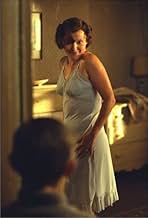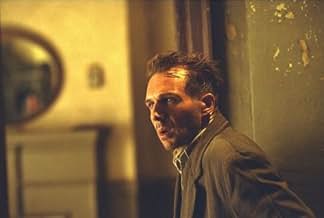A mentally disturbed man takes residence in a halfway house. His mind gradually slips back into the realm created by his illness, where he replays a key part of his childhood.A mentally disturbed man takes residence in a halfway house. His mind gradually slips back into the realm created by his illness, where he replays a key part of his childhood.A mentally disturbed man takes residence in a halfway house. His mind gradually slips back into the realm created by his illness, where he replays a key part of his childhood.
- Awards
- 13 wins & 25 nominations total
Featured reviews
David Cronenberg's film, based on a novel adapted by its author, Patrick McGrath, is set in London in the late 1980's, and explores the effects of an infamous Conservative government policy, whereby expensive, outdated mental hospitals were streamlined and the inmates released with limited supervision, a process that was termed Care in the Community. The film focuses on Spider, an elusive mental patient, institutionalised for most of his life, now released and returned back to a halfway house in East London, the place of his childhood, to fend for himself in the outside world.
This does not look to the uninformed like a Cronenberg film, there being no teleportation, telepathic head-blowing or the like, but once viewed, the film is clearly in Cronenberg's territory. From the beginning of the 1990's, he has seemed to be searching (it seems to me at times desperately) for new subjects in which to explore his morbid fascination. This fascination concerns the consequences of illness. Illness is given outrageous forms in his earlier films, a car accident which debilitates Christopher Walken in The Dead Zone, for instance, one of its effects being morbid clairvoyance. In Spider, Cronenberg focuses on the effect of illness on the brain, with its manifestation in what we would call the real world, when scientists actually view our 'real' world as a simulation made by our brains (and therefore our bodies).
As ever, Cronenberg, unlike other directors, does not condescend and go for the easy option, in other words making Spider a neatly disturbed, good-looking human, glamorised by his tragic sense of unreality, i.e. A Beautiful Mind. Instead, he really explores what it might be like for an intelligent man who tries to make sense of a world and past warped by mental disturbance, and questions his perception and sense of reality. Cronenberg gives Spider pathos and humanity, but never glamorises him.
Ralph Fiennes inhabits Spider naturally and impressively, bringing to the role his consistent qualities of commitment and intensity. The supporting cast is wonderful. Gabriel Byrne plays Spider's father with his rich sourness and Miranda Richardson, in a double role, shows why she is such a hidden, rough gem of British acting (at least to the wider world).
In Spider, Cronenberg Is Back To His Best With A Characteristically Original Film About Society and Mental Illness
This does not look to the uninformed like a Cronenberg film, there being no teleportation, telepathic head-blowing or the like, but once viewed, the film is clearly in Cronenberg's territory. From the beginning of the 1990's, he has seemed to be searching (it seems to me at times desperately) for new subjects in which to explore his morbid fascination. This fascination concerns the consequences of illness. Illness is given outrageous forms in his earlier films, a car accident which debilitates Christopher Walken in The Dead Zone, for instance, one of its effects being morbid clairvoyance. In Spider, Cronenberg focuses on the effect of illness on the brain, with its manifestation in what we would call the real world, when scientists actually view our 'real' world as a simulation made by our brains (and therefore our bodies).
As ever, Cronenberg, unlike other directors, does not condescend and go for the easy option, in other words making Spider a neatly disturbed, good-looking human, glamorised by his tragic sense of unreality, i.e. A Beautiful Mind. Instead, he really explores what it might be like for an intelligent man who tries to make sense of a world and past warped by mental disturbance, and questions his perception and sense of reality. Cronenberg gives Spider pathos and humanity, but never glamorises him.
Ralph Fiennes inhabits Spider naturally and impressively, bringing to the role his consistent qualities of commitment and intensity. The supporting cast is wonderful. Gabriel Byrne plays Spider's father with his rich sourness and Miranda Richardson, in a double role, shows why she is such a hidden, rough gem of British acting (at least to the wider world).
In Spider, Cronenberg Is Back To His Best With A Characteristically Original Film About Society and Mental Illness
After seeing every single Cronenberg film I've been able to find, I've come to one simple conclusion: I've seen entirely too little of his works. I have yet to see one film of his that I found a complete waste of time(though I did not find much point in The Brood). This is quite possibly my favorite film of his yet, and I guess that says something about how few of his films I've seen(as this seems like one of his more unappreciated films). The film is quite dark and bleak. It has a fairly slow pace, but there's plenty of atmosphere and I never really felt like turning it off. The plot is very good, and I liked the way it developed somewhat out of joint, with little continuity other than the main plot-line. The acting is superb. One actress performs two roles, and does so with such talent that I never realized they were being portrayed by one and the same person. I only discovered this after checking out the cast list. Spider is a very unsettling film, but I suppose Cronenberg has done far better in other films. For some reason, I just found this the more easily accessible of his films, the one that requires least afterthought to be understood, to decipher what he wanted to say. All of the other films by him that I've seen, I've required to basically 'be told' what the film was about... with this one, I thought for a while after seeing it, and figured it out, put the pieces together myself, without much difficulty. Maybe that's a problem for the film... it's too simple. It's far more simple than the usual Cronenberg, and that is what makes me like it more, and his more experienced and analyzing fans like it less. I recommend this film to any fan of Cronenberg and/or dark films. Don't expect to be able to figure out the film from just one viewing, and don't take anything you see in it at face value. 8/10
spider is a strange but beautiful film. don't let yourself be influenced by all the intellectual approaches to define the plot of the movie. it's not necessary. spider whispers a silent story about different perceptions of reality and truth. it is touching and rather adressing the heart than the brain. the story is driven by a strong sexual theme concerning the relationship between mother and son.
the performances are throughout excellent. cronenberg hat created one of his best films. go and see it.
the performances are throughout excellent. cronenberg hat created one of his best films. go and see it.
This film is one of the most under-rated, I have to say. I know it takes awhile to get into and you have to use your mind while you watch it but it's not THAT complicated, is it? Especially if you watch this film more than once you really become to understand what it is it with Spider. I don't want to give away the plot, because you really have to see it for yourself. It's surprising and pleasantly different.
I have to highlight the acting in the film, it's that superb. All the actors are just simply amazing, taking the acting to a completely new level. So, if you want to try something that's not so mainstream film-making, watch Spider. I dare you.
I have to highlight the acting in the film, it's that superb. All the actors are just simply amazing, taking the acting to a completely new level. So, if you want to try something that's not so mainstream film-making, watch Spider. I dare you.
SPIDER (2003) *** Ralph Fiennes, Miranda Richardson, Gabriel Byrne, Bradley Hall, Lynn Redgrave, John Neville. Filmmaker David Cronenberg does it again : mixing psychological drama with Gothic mystery with the cloak of violence in the air with Fiennes (in a brilliantly mannered near mute turn) as the titular character, a schizophrenic recently released to a halfway house, nicknamed in his youth by his mother (Richardson who gives an excellent turn to the third power; she inhibits three interlaced roles that act as the story's linchpin) for his cat's cradle yarn confections which sends his scattershot memories into overdrive as he attempts to connect the missing pieces of his life. Told in intersperses of flashback Cronenberg expertly uses his persuasive powers of dread eke out the thin plottings of Patrick McGrath's novel who adapted the screenplay too that can tax on the nerves in long, baroque stretches of near silence. Dank, rotting production design by Andrew Sanders, excellently lensed by Peter Suschitzky and the chamber music-like score by Howard Shore makes the most of its broken-minded protagonist's living nightmare.
Did you know
- TriviaDavid Cronenberg received the screenplay from Patrick McGrath out of the blue, with a note attached saying that Ralph Fiennes was interested in playing the part of Spider. After about four pages, Cronenberg had decided that he wanted to do the film.
- GoofsCamera is reflected in broken window of asylum.
- ConnectionsFeatured in SexTV: Dark Desires: Sexuality in the Horror Film (2003)
- How long is Spider?Powered by Alexa
Details
Box office
- Budget
- $10,000,000 (estimated)
- Gross US & Canada
- $1,642,483
- Opening weekend US & Canada
- $5,575
- Dec 22, 2002
- Gross worldwide
- $5,808,941
- Runtime1 hour 38 minutes
- Color
- Sound mix
Contribute to this page
Suggest an edit or add missing content






































